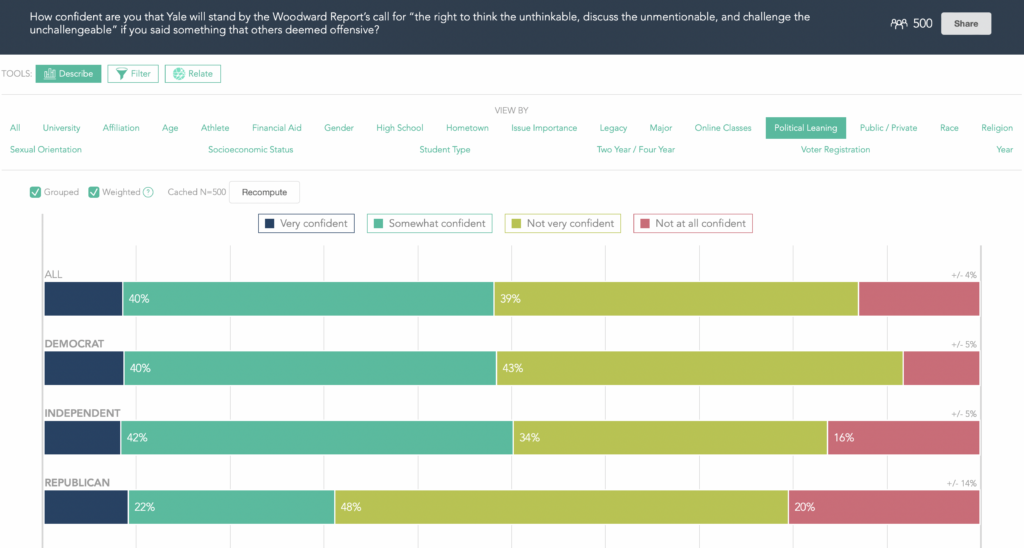
Buckley Institute Releases Survey of Yale Undergraduates: “I had no idea just how important free speech would be”

An alarming 55% are not at all familiar with the Woodward Report, Yale’s free speech policies
Yale students overwhelmingly want the presidential search committee to prioritize free speech
The Buckley Institute released findings from its survey of Yale undergraduates, gauging their perspectives on free speech on campus and its importance in Yale’s ongoing search for a new president.
Conducted by College Pulse, the survey of 500 Yale undergraduates found that the Yale undergraduate student body is woefully uninformed about their free speech rights on campus. An alarming 55% of Yale undergraduates are “not at all familiar” with the Woodward Report, Yale’s free speech policies. As a natural consequence, a majority of Yale undergraduates (52%) are not confident Yale would support their right to free speech if something they said was deemed offensive by others.
In the survey, Yalies expressed their frustration with the censorious environment on campus and called for change. 65% agree that the Yale presidential search committee should prioritize candidates committed to strengthening free speech on campus.
“There is no question that Yale students want leadership that stands up for free speech on campus,” said Lauren Noble ’11, Buckley Institute Founder and Executive Director. “Yale isn’t educating its students on their free speech rights and isn’t standing up for those rights either. The presidential search committee should heed the call of nearly two-thirds of the Yale student body who want a leader who is committed to strengthening free speech.”
Sadly, Yale students feel the administration has done little to support free speech. 71% report hearing not too often (53%) or not at all (18%) from faculty, administrators, or first-year counselors about the value of free speech. Half (50%) believe Yale is unwelcoming to students who hold political opinions that are unpopular on campus. And while the majority of students aren’t confident Yale will stand by them if they shared a perspective others deem offensive, Republicans feel the most under threat (only 31% feel confident versus 49% of Democrats).
Perhaps this is why 43% of Yale undergraduates report self-censoring somewhat (33%) or very (10%) often. 46% say they don’t feel comfortable expressing disagreement with professors about controversial political topics in written assignments.
Most Yale undergraduates want a campus environment that is more conducive to free speech. 81%, including strong majorities across all political leanings, do want the Woodward Report promise of “unfettered freedom, the right to think the unthinkable, discuss the unmentionable, and challenge the unchallengeable” to be Yale’s official free speech policy. 88% agree that Yale should honor First Amendment free speech protections on campus even though it’s a private university. 87% believe Yale should allow even controversial speakers on campus.
In their responses, Yale students on both sides of the aisle were clear on the importance of free speech and political diversity:
“I, myself, am a progressive… I think the political views across Yale itself could do a better job of representing the real world since we all ought to be able to defend our viewpoints in the face of criticism, rather than shutting out anybody who could potentially criticize us”
“Although I myself lean left, I think that especially the liberal tendencies on campus have reached a point where there is unfounded antagonism towards people of different political and cultural views”
“… The Yale administration needs to step up their involvement in protecting free speech and promoting free speech values amongst its students…”
Presidential Search
- 65% of Yale students agree that the Yale presidential search committee should prioritize candidates committed to strengthening free speech on campus
- 56% believe Yale should take action to promote political diversity among its faculty
- 46% want the next president to host and moderate debates on contentious topics to model civil dialogue across the political spectrum
- 44% want Yale’s next president to hire faculty with intellectually diverse viewpoints
- 33% believe Yale should offer courses and other programming throughout the year to educate students on free speech
- 31% think Yale’s next president should provide every incoming student with a copy of the Woodward Report, Yale’s free speech policy, before they arrive on campus
Free Speech
- 84% of Yale students believe it is important for a healthy campus life that the distinctions between speech and violence are maintained rather than Yale treating speech as violence (16%)
- 50% believe Yale should discipline students who deliberately disrupt classes or events to prevent the voicing of views with which they disagree
- 31% of students believe there should be career consequences for students who disrupt speakers with whom they disagree
Censorship
- 64% of Yale students agree with the statement, “administrators should regulate speech by students. Hateful speech should not be tolerated at Yale”; versus 36% who think “administrators should never regulate speech by students”
- 33% agree that it is acceptable to shout down a speaker to prevent them from speaking on campus
- 20% believe it is justifiable to use physical violence to stop hate speech
Israel-Palestine
- 19% of Yale students believe “the Palestinians’ frustration and anger about their treatment by Israel justify the [October 7 Hamas terror] attack” versus 81% who say “there is no justification for attacking civilians”
- 70% agree with Yale’s decision to support the free speech of Yale Professor Zareena Grewal who celebrated Hamas’ October 7th terror attack
The sample includes 500 Yale undergraduates pulled from College Pulse’s America College Student Panel™, and was collected between 11/07-11/15. Results have been weighted to be representative of the demographic distribution of the Yale student body. You can access the results here.
Other Buckley Institute surveys are available on our website.
